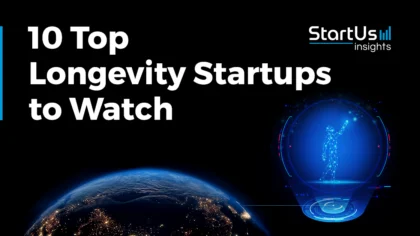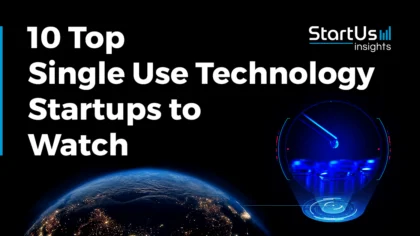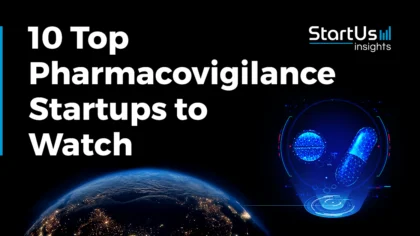Accelerate Productivity in 2025
Reignite Growth Despite the Global Slowdown
The pharmaceutical industry faces rising R&D costs, complex supply chain management, and sensitive data management. The implementation of artificial intelligence addresses these issues by accelerating drug development, automating regulatory compliance reporting, managing large patient and medical data sets, and optimizing the clinical trial process. For instance, Swiss startup Risklick leverages AI to streamline clinical trial protocols and integrate historical data as well as regulatory guidelines to enhance study designs and reduce time-to-market.
As AI applications in the pharmaceutical industry continue to evolve, stakeholders must integrate these emerging innovations into their operations to optimize research capabilities, enhance data-driven decision-making, and address the increasing demand for better patient solutions.
Why should you read this report?
- Gain insights into the top 10 use cases of AI in Pharma
- Learn about practical applications
- Meet 10 innovative startups advancing these applications
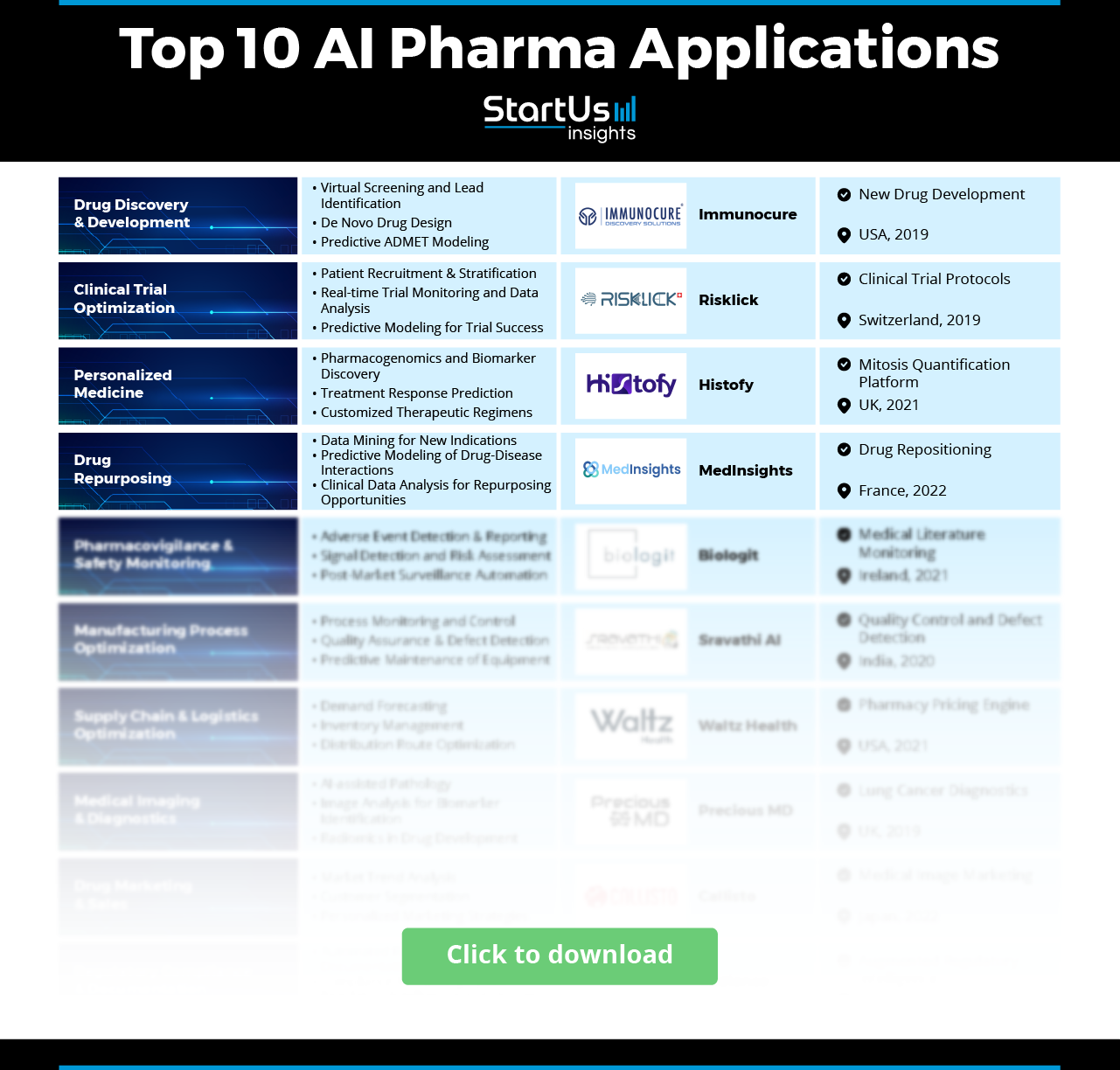
Key Takeaways
- Drug Discovery and Development
- Use Cases:
- Virtual Screening and Lead Identification
- De Novo Drug Design
- Predictive ADMET Modeling
- Startup to Watch: Immunocure
- Use Cases:
- Clinical Trial Optimization
- Use Cases:
- Patient Recruitment and Stratification
- Real-time Trial Monitoring and Data Analysis
- Predictive Modeling for Trial Success
- Startup to Watch: Risklick
- Use Cases:
- Personalized Medicine
- Use Cases:
- Pharmacogenomics and Biomarker Discovery
- Treatment Response Prediction
- Customized Therapeutic Regimens
- Startup to Watch: Histofy
- Use Cases:
- Drug Repurposing
- Use Cases:
- Data Mining for New Indications
- Predictive Modeling of Drug-Disease Interactions
- Clinical Data Analysis for Repurposing Opportunities
- Startup to Watch: MedInsights
- Use Cases:
- Pharmacovigilance and Safety Monitoring
- Use Cases:
- Adverse Event Detection and Reporting
- Signal Detection and Risk Assessment
- Post-Market Surveillance Automation
- Startup to Watch: Biologit
- Use Cases:
- Manufacturing Process Optimization
- Use Cases:
- Process Monitoring and Control
- Quality Assurance and Defect Detection
- Predictive Maintenance of Equipment
- Startup to Watch: Sravathi AI
- Use Cases:
- Supply Chain and Logistics Optimization
- Use Cases:
- Demand Forecasting
- Inventory Management
- Distribution Route Optimization
- Startup to Watch: Waltz Health
- Use Cases:
- Medical Imaging and Diagnostics
- Use Cases:
- AI-assisted Pathology
- Image Analysis for Biomarker Identification
- Radiomics in Drug Development
- Startup to Watch: Precious MD
- Use Cases:
- Drug Marketing and Sales
- Use Cases:
- Market Trend Analysis
- Customer Segmentationn
- Personalized Marketing Strategies
- Startup to Watch: Callisto
- Use Cases:
- Regulatory Compliance and Documentation
- Use Cases:
- Automated Reporting and Documentation
- Compliance Monitoring Systems
- Regulatory Intelligence and Change Management
- Startup to Watch: Cedience
- Use Cases:
FAQs: Applications of AI in Pharma Industry
1. How is AI used in pharma?
AI advances the pharmaceutical industry by streamlining drug discovery, optimizing clinical trials, and enhancing personalized medicine. In drug discovery, AI algorithms rapidly analyze vast datasets to identify potential drug candidates and predict their efficacy and toxicity profiles, for reducing research timelines.
AI improves patient recruitment in clinical trials by analyzing electronic health records to match participants based on specific criteria, thus increasing the trial’s efficiency. Moreover, AI-powered tools enable personalized medicine by analyzing patient data to predict individual responses to treatments, tailoring therapies for better outcomes.
2. What is the future of AI in the pharmaceutical industry?
The future of AI in the pharmaceutical industry involves deeper integration across the entire drug development lifecycle, leading to faster, more cost-effective, and precise solutions. AI’s role will expand in predictive analytics, enabling pharmaceutical companies to forecast market demand, optimize supply chains, and make data-driven decisions.
Additionally, advancements in AI-powered drug design, such as generative models, will allow for the creation of novel compounds with improved efficacy and safety profiles. AI will also enhance regulatory compliance processes by automating documentation to ensure faster and more accurate submissions to regulatory bodies.
Where is this Data from?
StartUs Insights provides data through its comprehensive Discovery Platform, which covers 4.7+ million startups, scaleups, and tech companies globally, as well as 20K+ emerging technologies & trends. The platform excels in startup and technology scouting, trend intelligence, and patent searches, offering a detailed view of the innovation landscape.
For this report, we analyzed technologies within specific industries using the trend intelligence feature. During this research, we identified patterns and trends, pinpointing relevant use cases and the startups developing solutions for each. More capabilities and details are available at StartUs Insights Discovery Platform.
Top 10 Applications of AI in Pharma [2025 & Beyond]
1. Drug Discovery and Development
Artificial Intelligence enhances drug design and development by accelerating the discovery process, reducing the cost, and improving success rates. To achieve this, AI algorithms analyze vast chemical libraries to identify drug candidates with desired properties which reduces the time and resources required for traditional screening methods. For instance, predictive ADMET (Absorption, Distribution, Metabolism, Excretion, and Toxicity) modeling identifies issues of the drug early in the development process and reduces late-stage attrition rates.
Diver Deeper:
- Noteworthy Example: Merck launched a drug discovery SaaS platform, AIDDISON which addresses the gap between virtual molecule design and real-world manufacturing
- Financial Landscape: AI startups that work on solutions for new drug discovery and development receive a median funding of USD 7.35 million.
Startup to Watch: Immunocure
US-based startup Immunocure develops a drug discovery platform utilizing generative AI and computational chemistry. The startup’s product AxDrug identifies new drug candidates for clients by leveraging deep learning and machine learning. Its ChemBio-SAR module generates predictive models, and aids in molecule generation.
It performs molecular dynamic simulations (MDS) for drug candidates which provides insights about molecular motions over time. The solution enables the identification and optimization of small molecules with high binding affinity and selectivity. Another solution, PROTACs (PROteolysis TArgeting Chimeras) address the challenge of undruggable proteins through targeted protein degradation.
2. Clinical Trial Optimization
By analyzing vast medical records, genetic information, and demographic data AI enables targeting suitable candidates for optimizing clinical trials. It enables patient recruitment and stratification processes and identifies specific trial criteria. Real-time monitoring allows tracking the trial progress with good accuracy and speed.
Also, AI-driven predictive modeling enhances trial success by forecasting potential outcomes based on historical data and trial parameters. Predictive analytics enables to simulate different trial designs and predicts outcomes for a given drug or therapy. AI enables adaptive trial designs by analyzing incoming data and making real-time adjustments to parameters like sample size, dosing and predicts the potential impacts.
Diver Deeper:
- Noteworthy Example: IQVIA has developed an AI Assistant to provide rapid insights for clinical trials. It allows businesses to ask complex questions about their clinical trials and receive comprehensive answers within moments.
- Financial Landscape: AI startups that work on solutions for clinical trial optimization receive a median funding of USD 7.31 million.
Startup to Watch: Risklick
Swiss startup Risklick develops clinical trial products using AI which enables high-quality protocols and study plans. The company’s product Protocol AI features a comprehensive database, reduces development timelines, and accelerates the time to market.
The startup’s generative AI solution understands design requirements and generates protocols according to the client’s needs. It integrates historical data, regulatory guidelines, and safety information to generate the optimum protocol. The process involves three steps where the first step involves analyzing all design elements followed by optimizing the study design based on multiple scenarios and finally the creation of a protocol using generative AI.
3. Personalized Medicine
AI interprets large volumes of patient data using data analytics and deep learning algorithms to enhance treatment efficiency and improve patient outcomes in healthcare. It identifies genetic variations that affect individual responses to drugs through pharmacogenomics and facilitates drug development.
AI forecasts how individuals respond to specific treatments using genetic profiles, medical history, and lifestyle factors. The integration of AI in biomarker discovery leads to the identification of precise targets for drug discovery. Predicting treatment responses allows the design of customized therapeutic regimens for delivering personalized medicine.
Diver Deeper:
- Noteworthy Example: Pfizer is leveraging AI for delivering personalized medicine for individual genetic makeup instead of a one-size-fits-all paradigm.
- Financial Landscape: AI startups that work on solutions for personalized medicine receive a median funding of USD 10 million.
Startup to Watch: Histofy
UK-based startup Histofy leverages AI to develop new solutions for pathology and delivers personalized medicine. It integrates with existing workflows and offers solutions for tissue-based diagnostics and prognostics using computational pathology. The company’s product Mitpro performs AI-driven mitosis quantification and profiling which increases the speed and depth of analysis.
It quantifies mitosis profiling with specific regions of interest and integrates with the existing workflows. Also, the startup offers an AI-powered colon biopsy screening tool that differentiates between normal and abnormal slides. This process enhances biomarker discovery and offers accurate cancer grading through whole slide images of mitosis.
4. Drug Repurposing
The discovery of new therapeutic applications for existing drugs advances clinical trials, genomic information retrieval, and increases the probability of curing diseases. AI algorithms analyze electronic health records and medical datasets to identify new uses of approved medications. AI models simulate the effects of drugs on various biological pathways and predict their effects for different conditions. By analyzing electronic health records data, AI algorithms identify patterns and correlations for new drug applications.
The application of AI in drug repurposing enhances the accuracy of predictions and accelerates the discovery process.
Diver Deeper:
- Noteworthy Example: Som Biotech facilitates the repurposing of drugs for identifying new therapeutic indications for orphan disease.
- Financial Landscape: AI startups working on drug repurposing solutions receive median funding of USD 8.9 million.
Startup to Watch: MedInsights
French startup Medinsights discovers therapeutic options for patients through the process of drug repurposing. The company’s product Nexus-Rx serves as a drug repositioning engine that detects relationships between disease and target drugs. The solution consists of different modules starting from genoptimizer which understands the relationship between gene expression and disease. Pheno-Connect, which connects gene-network information to clinical features. Rx Finder, which analyzes drug-gene interactions and identifies key factors in disease pathways.
Opti-Mouse, which are genetic animal models that mimic human diseases and Clinicalyzer which provides clinical trial intelligence for the drug development process. It generates network models that visualize disease progression and drug interactions at the molecular level. Also, it uncovers uses for existing medications based on their interaction with disease pathways and pharmacological actions. It improves clinical trials and addresses the medical needs of complex diseases.
5. Pharmacovigilance and Safety Monitoring
Natural language processing enables the system to analyze the vast amount of data from diverse sources like scientific literature, electronic health records, and social media platforms which offers adverse event detection, signal identification, and risk assessment. Drug monitoring systems that use AI detect adverse drug reactions and forecast potential safety issues.
By analyzing data from social media, and wearable devices, it detects signals of adverse events and identifies vulnerable patient populations. This real-time monitoring capability reduces the time required for signal detection and data analysis, promotes timely interventions and regulatory actions.
Diver Deeper:
- Noteworthy Example: Bayer utilizes AI through its partnership with Genpact to optimize its pharmacovigilance practices. It leverages machine learning, RPA, and natural language processing to automatically process adverse events and improve safety monitoring.
- Financial Landscape: AI startups that work on solutions for pharmacovigilance and safety monitoring receive a median funding of USD 6.4 million.
Startup to Watch: Biologit
Irish startup Biologist offers solutions for human and veterinary pharmacovigilance leveraging AI using the scientific literature monitoring platform. The company’s product biologit MLM-AI platform comprises of database containing information about medical devices, veterinary products, and cosmetics that offers traceable results for safety screening. Another product biologist Database which is integrated into the platform, offers compliant regulatory searches and acts as a tool for medical literature monitoring. It improves safety, automates pharmacovigilance activities with increased speed, and improves the overall quality of pharmaceutical products.
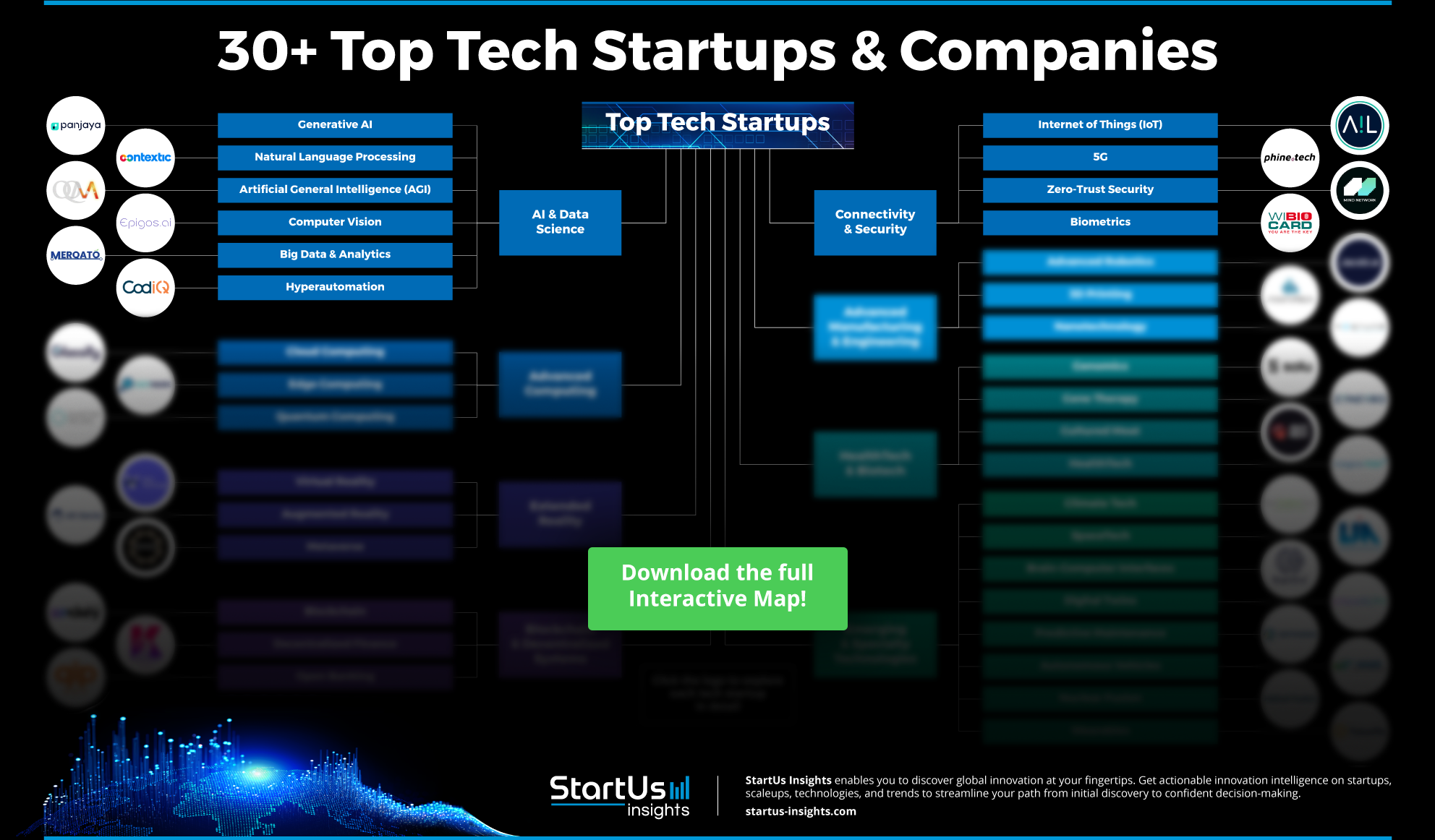
6. Manufacturing Process Optimization
By leveraging computer vision, and data analytics, AI enhances quality control, process monitoring, and defect detection in pharmaceutical manufacturing. Continuous monitoring of production data ensures product quality and reduces the risk of batch failures. AI algorithms detect deviations in process parameters and improve the quality and defect detection.
Automated inspections minimize human error and ensure compliance with quality standards. AI forecasts equipment failure by analyzing historical data and performs maintenance just in time. This proactive approach minimizes unplanned downtime, extends equipment lifespan, and ensures consistent production quality.
Diver Deeper:
- Noteworthy Example: Lonza uses computer vision and AI to optimize product quality in drug manufacturing, defect detection, and genetic engineering techniques. It enables AI-driven route scouting for active pharmaceutical ingredients.
- Financial Landscape: AI startups that work on solutions for manufacturing process optimization receive a median funding of USD 4.8 million.
Startup to Watch: Sravathi AI
Indian startup Sravathi AI develops pharma and chemical products by utilizing AI to address challenges in the areas of chemical synthesis, property measurement, in-vitro screening, and clinical trials. The company’s platform offers features like molecular modeling, De novo drug designing, molecular dynamic simulations, and property predictions. It uses density functional theory as the solution for drug discovery that identifies hit compounds at less computational time. By utilizing hybrid intelligence of the human mind and proprietary AI algorithms, the company makes accurate predictions on molecular interactions like polymers, catalysts, and chemical reactions for the manufacturing of drugs.
7. Supply Chain and Logistics Optimization
AI systems enhance the efficiency of the supply chain and logistics in the pharmaceutical industry. It enables pharma companies to streamline operations and reduce costs through techniques like demand forecasting, inventory management, and distribution route optimization. AI algorithms analyze sales figures, market trends, and external factors like weather patterns and social media sentiments for accurate predictions of customer demand.
Also, it determines optimal inventory levels, reduces manual errors, and prevents stockouts. For determining the optimal distribution route, AI algorithms analyze traffic patterns, weather conditions, and road closures to determine the efficient delivery route. It provides real-time tracking, product movement monitoring, temperatures, and storage conditions throughout the supply chain.
Diver Deeper:
- Noteworthy Example: GSK Pharma predicts demand fluctuations and optimizes inventory levels through the integration of AI and machine learning capabilities
- Financial Landscape: AI startups that work on solutions for supply chain and logistics optimization receive a median funding of USD 6.5 million.
Startup to Watch: Waltz Health
US-based startup Waltz Health optimizes the pharmacy supply chain by leveraging AI to modify pricing strategies and prescription care. The solution addresses the challenges of the supply chain by developing consumer tools to guide decisions on prescription care and minimizes the operation issues of pharmacies. AI-driven tools reduce the costs of the supply chain and introduce smart cash solutions for pharmacies. The company’s predictable pricing searches all of the major savings programs to find the optimum one without switching pharmacies and optimizing the pharmacy supply chain.
8. Medical Imaging and Diagnostics
Machine learning algorithms detect patterns and anomalies from medical images to diagnose diseases early on. This technology identifies specific cancer types to guide personalized treatment strategies. AI-powered tools analyze multimodal imaging data that includes MRI, CT scans, and molecular imaging to extract biomarkers that indicate disease progression or treatment response.
The extraction of quantitative features from medical images aids in finding hidden patterns and correlations that provide insights into disease characteristics and treatment outcomes. The integration of radiomics with clinical information enables accurate disease detection and personalized treatments.
Diver Deeper:
- Noteworthy Example: GE Healthcare has introduced an AI algorithm that is embedded in X-ray devices and detects life-threatening conditions. It enhances critical patient diagnosis through medical imaging and patient care.
- Financial Landscape: AI startups that work on solutions for medical imaging and diagnostics receive a median funding of USD 6 million.
Startup to Watch: Precious MD
UK-based startup Precious MD combines artificial intelligence capabilities with medical imaging to modify diagnostic approaches in lung cancer. The startup’s product ChestClearAI enables early detection of lung cancer by identifying subtle patterns in imaging data. It enhances precision medicine without the invasive requirement of biopsies and detects genetic mutations, such as EGFR, from medical scans like CT images.
It features automated lung inspection, nodule detection, and malignancy risk assessment that offers accurate results. The solution enhances radio genomics to overcome traditional diagnostic limits and brings a precise tumor view in cancer treatment.
9. Drug Marketing and Sales
AI-powered technologies enable pharmaceutical companies to analyze market trends, customer behavior, and competitor activities. This approach gives valuable insights and drives marketing strategies for new drugs and pharmaceutical sales. Deep learning algorithms identify emerging trends, predict market shifts, and inform product positioning strategies.
Customer segmentation is modified based on behavior-based approaches where AI algorithms analyze multiple data points, including prescription patterns, patient demographics, and healthcare provider preferences. Personalized marketing strategies extend to email campaigns, digital advertising and interactions with sales representatives. AI-powered tools provide real-time recommendations and suggest the optimized approach for each healthcare provider based on their preferences and past interactions.
Diver Deeper:
- Noteworthy Example: AstraZeneca integrates AI-driven sales coaching which analyzes vast data of field coaching and increases sales
- Financial Landscape: AI startups that work on solutions for drug marketing and sales receive a median funding of USD 15.4 million.
Startup to Watch: Callisto
Japanese startup Callisto develops a platform that combines medical image datasets which includes radiography images, pathology images, and molecular diagnostic results. The platform supports the creation of AI models for drug discovery, diagnostic tools, and clinical research. The startup selects, and annotates the medical image data, and sells it to medical device manufacturers and pharmaceutical companies. It ensures that data shared by them meets the compliance and data protection standards.
10. Regulatory Compliance and Documentation
One of the key applications of AI in regulatory compliance and reporting is automation and documentation. It saves time and reduces the risk of errors associated with manual data entry and analysis. Machine learning models identify patterns and anomalies in regulatory data and address them before they escalate into compliance breaches.
Compliance monitoring systems provide real-time oversight of regulatory adherence and alert relevant stakeholders about necessary changes or non-compliance risks. Predictive analytics forecast regulatory trends that allow pharmaceutical companies to adapt their strategies. AI-driven platforms analyze regulatory information from multiple global sources and provide insights to navigate complex regulatory landscapes.
Diver Deeper:
- Noteworthy Example: Novartis invests in regulatory document approval using AI capabilities and simplifies the medical writing process
- Financial Landscape: AI startups that work on solutions for regulatory compliance and documentation receive median funding of USD 5.56 million.
Startup to Watch: Cedience
Canadian startup Cedience offers an augmented regulatory intelligence platform that holds vast data of regulatory records. It integrates natural language processing (NLP) and machine learning (ML) to automate data collection from a wide array of regulatory databases. It serves as the source for solutions to complex regulatory questions and provides evidence-backed answers.
The company’s solution supports drug development by visualizing the studies which leads to better regulatory decisions. The platform annotates and extracts data points directly from regulatory documents and supports collaboration for data capture and analytics. Regulatory intelligence teams utilize the startup’s platform to detect topics of interest across knowledge bases
Leverage Emerging AI-led Technologies in Pharma Industry
Top investors like Y Combinator, EIC Fund, European Innovation Council, Pharmstars, and Khosla Ventures support startups focusing on AI applications in the Pharma industry. They provide crucial funding that drives innovation. This funding majorly spans seed, early-stage VC/Series A, accelerator/incubator, pre-seed, and angel rounds. Whereas, the average funding per round stands at USD 19.5 million, supporting early-stage startups developing AI-powered solutions advancing the pharmaceutical industry.
Act now on the emerging technologies transforming the pharmaceutical industry. With StartUs Insights, you swiftly discover hidden gems among over 4.7 million startups, scaleups, and tech companies, supported by 20,000 trends and technologies. Our AI-powered search and real-time database ensure exclusive access to innovative solutions, making the global innovation landscape easy to navigate.
Trusted by industry leaders like Samsung, Nestlé, and Magna, we provide unmatched data, a 360-degree industry view, and data-driven intelligence for confident strategic decisions. Leverage our innovation services to optimize costs, streamline operations, and stay ahead of the curve. Get in touch today to explore how our comprehensive innovation intelligence can drive your success.
Discover All AI-led Pharma Technologies & Startups!
![AI and Pharma: Discover What the Future Holds [2025 & Beyond]](https://www.startus-insights.com/wp-content/uploads/2024/11/AI-and-Pharma-SharedImg-StartUs-Insights-noresize-420x236.webp)
